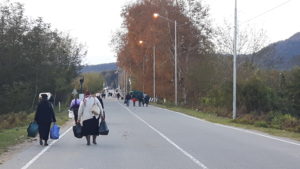

 Abkhazian authorities have announced they are introducing ‘temporary restrictions on the import of agricultural products from Georgia into Abkhazia’. They said the ban is a response to outbreaks of the brown marmorated stink bug, an agricultural pest which has devastated crops in the western Caucasus in recent years. Last week, Russia banned agricultural imports from Abkhazia.
Abkhazian authorities have announced they are introducing ‘temporary restrictions on the import of agricultural products from Georgia into Abkhazia’. They said the ban is a response to outbreaks of the brown marmorated stink bug, an agricultural pest which has devastated crops in the western Caucasus in recent years. Last week, Russia banned agricultural imports from Abkhazia.
Abkhazia’s ban includes imports of fruits, nuts, and vegetables, both hand-carried and packaged goods, and came into force on Saturday.
In a statement on Friday, the Abkhazian Plant Quarantine Inspectorate said they had discovered stink bugs in the hand baggage of people crossing the the Enguri (Ingur) checkpoint ‘several times’, according to Apsnypress.
‘According to preliminary calculations, the economic damage from the pest, in the event of its acclimatisation and distribution across Abkhazia, may amount to more than ₽1 billion [$17 million]’, the statement said.
Last year, stink bugs ravaged crops across Samegrelo and Abkhazia. Crops in Abkhazia, and especially its eastern Gali District — populated almost exclusively by ethnic Georgians — were devastated by the pest. As a result, many farmers abandoned their hazelnut crops entirely.
[Read on OC Media: Georgian aid for Abkhazia’s ravaged farmlands has mysteriously disappeared]
Russian embargo on Abkhazian agricultural goods
On Thursday, Russia’s Federal Service for Veterinary and Phytosanitary Surveillance, Rosselkhoznadzor, announced a ban on Abkhazian agricultural imports starting from 2 April.
Rosselkhoznadzor claimed that ‘temporary restrictions’ were being introduced in order to ‘prevent the spread of a dangerous object [the stink bug] to the territory of the Russian Federation and to preserve the export potential of the country’.
They later blamed Georgia for spreading the pest, saying it ‘may be a part of biological sabotage’. Georgia has dismissed the claims.
[For details, read on OC Media: Russia bans agricultural imports from Abkhazia, accuses Georgia of ‘biological sabotage’]
According to research from the Russian Academy of Sciences, the stink bug was first detected in the region in the Russian city of Sochi, near Abkhazia’s western border, no later than 2013, and ‘thereafter it spread to Abkhazia and Georgia’. According to the researchers, the pest was spotted in Georgia by 2015.
Levan Davitashvili, Georgia’s Agriculture Minister, said last October that he could ‘say for sure’ that stink bug had spread from Abkhazia. According to him, ‘it makes it even harder to fight it, as we have no access there’.
For ease of reading, we choose not to use qualifiers such as ‘de facto’, ‘unrecognised’, or ‘partially recognised’ when discussing institutions or political positions within Abkhazia, Nagorno-Karabakh, and South Ossetia. This does not imply a position on their status.









